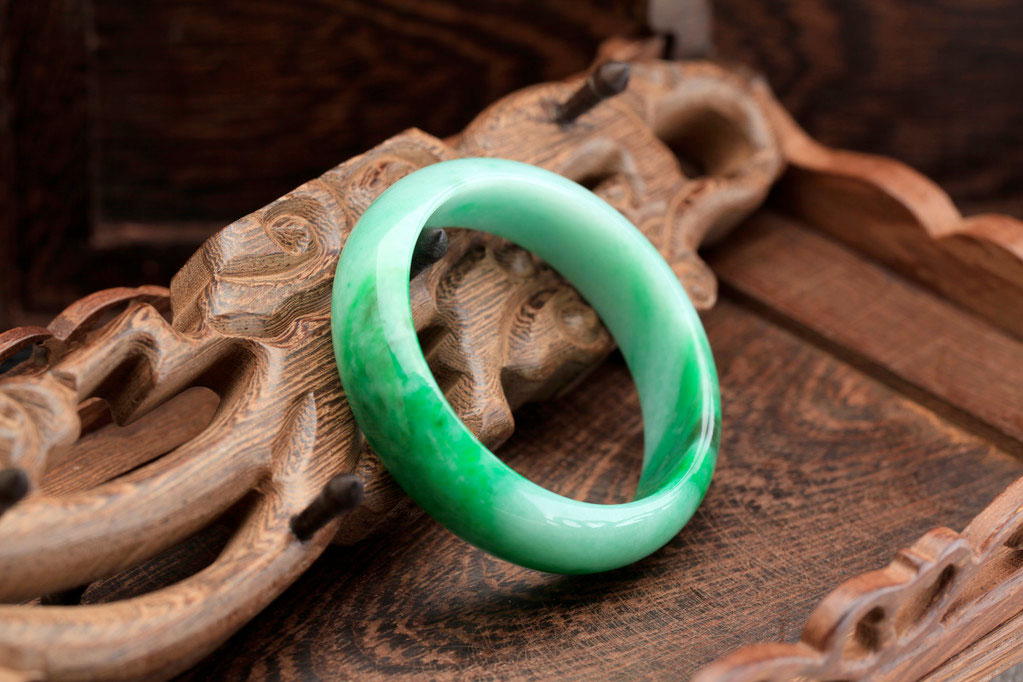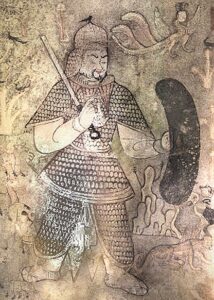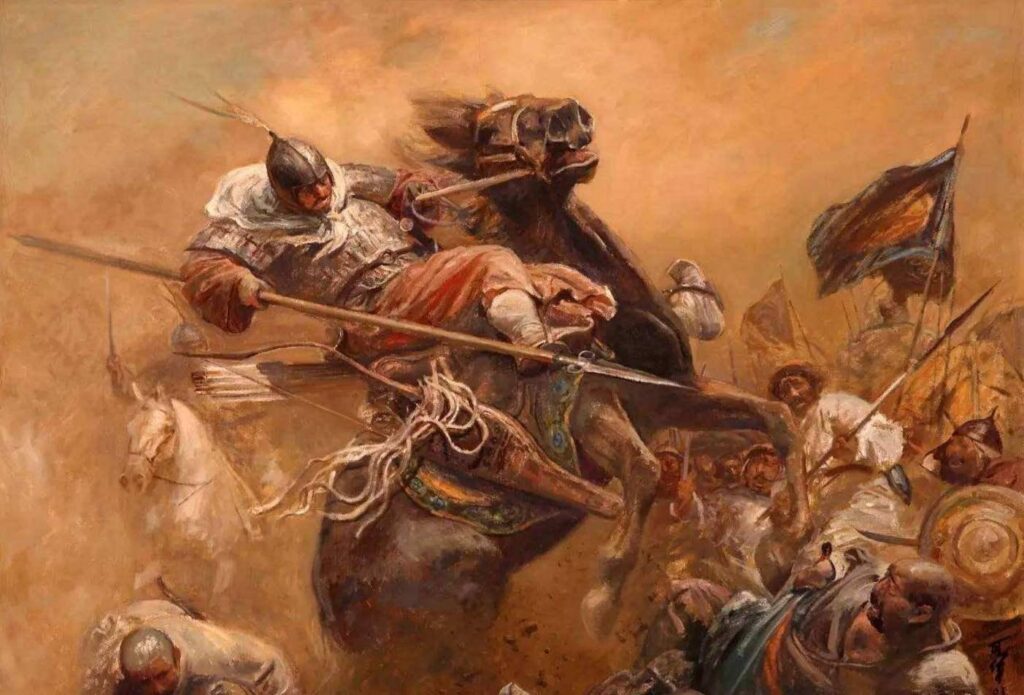Sitting Bull, one of the most important Native American leaders in the 1800s, once said, “I myself would rather die an Indian than live a white man.”
Sitting Bull was proud of his identity. He was willing to defend his heritage and home against unjust U.S government policies – even with his life.
Some people may point to his tragic death – he was shot by Indian police officers – as proof of the futility of resistance in a hopeless situation.
But I think there’s something so admirable about the purity of his convictions and principles. There’s a reason that his steadfast bravery has been immortalized in history for all time.
It’s better to be broken jade than flawless clay
寧為玉碎,不為瓦全 / 宁为玉碎,不为瓦全
Never betray your principles at any cost
China
Why Jade?
Throughout Chinese history, jade has conjured up unparalleled admiration, comparable to that of gold and diamond in the West.
It has been used in the design of delicate sculptures and objects, burial suits for the imperial family, accessories for the social elite, and even auspicious amulets with the power to ward off evil.
Jade also appears frequently in the Chinese language. It often symbolizes concepts such as purity, beauty, grace, and dignity. If you study or read Chinese, chances are, you will come across many more idioms and sayings that invoke this precious mineral/stone.
It makes total sense, then, that jade is upheld as the gold standard of integrity in this classic expression, even when shattered to pieces.

Origins of the Expression
The saying first appeared in Book of the Northern Qi, a text that details the history of the Northern Qi dynasty (550–577 CE).
The book was completed in 636 CE by Tang dynasty (618–907 CE) historian Li Baiyao.
The Story Behind the Expression
The history behind this idiom is like the plot of a Game of Thrones episode, full of treachery, betrayal and twists. Let’s see if I can do it justice.
Emperor Meets General
Northern Wei was an empire that was founded by the Tuoba clan, a nomadic minority of Xianbei ethnicity. This powerful family ruled Northern China from 386-535 CE.
During this time, they also decided to change their last name so every member of the royal family became a Yuan. This will be an important fact later on in the story, so remember this!
Emperor Xiaowu, a member of this very Yuan family, was the last emperor of Northern Wei.
By the time he took over, several groups of people were scheming to seize control of the dynasty. The most ambitious of the bunch was General Gao Huan.
The two didn’t trust each other and constantly sought to limit each other’s power.
The Ultimate Showdown
In 534, Emperor Xiaowu sent an edict to General Gao Huan.
In the message, he requested the general’s help to defeat rebels in another part of the empire. In truth, Emperor Xiaowu was hoping he could spring a surprise attack on General Gao Huan.

General Gao Huan saw through the plan right away. He instead marched with his troops towards the capital of Luoyang, home of the emperor.
Emperor Xiaowu’s advisers told him to flee — the imperial army was no match for the general’s men. The emperor fled west to re-establish the imperial government in Chang’an.
The Dynasty Splits
Meanwhile, General Gao Huan took over Luoyang.
Now he needed a puppet emperor. He chose the 10-year-old son to a cousin of Emperor Xiaowu, also part of the great Yuan family.
The kid was then renamed Emperor Xiaojing.
The former Northern Wei empire was split into two. Eastern Wei now had the new young, 10-year-old Emperor Xiaojing as its puppet ruler. Western Wei was ruled by Emperor Xiaowu, who had lost in his battle against the general.
But Emperor Xiaowu did not last long in his new position. Shortly after fleeing and moving to Chang’an, he was poisoned to death by his rivals.
General Gao Huan, on the other hand, was sitting comfortably in Eastern Wei.
Victory #2 for the General: Another Dynasty Is Born
Although General Gao Huan treated the child Emperor Xiaojing with respect on the surface, he was the one who held the real power.
He groomed his own sons to take over in the event of his own death.
Eventually, in 550, the general’s younger son Gao Yang successfully forced the puppet emperor to cede the throne to him.
Gao Yang became Emperor Wenxuan.
Eastern Wei was no more. Northern Qi was put in its place (what a hot mess).

The Bloody Massacre of the Former Child Emperor and Family
Even though he finally was on the throne he wanted so much, Emperor Wenxuan was plagued by paranoia. He was afraid that he would lose power.
His sycophantic advisors persuaded him that there was only one way to 100% secure his reign – kill the former puppet Emperor Xiaojing.
To any normal person, this might sound like a pretty psychotic plan (why pick on the person who’s harmlessly retired from your job?), but Emperor Wenxuan loved it.
He invited Xiaojing to the palace for a feast and poisoned him to death.
And of course, he didn’t stop there.
He then proceeded to massacre all of Xiaojing’s close relatives. Ultimately, he killed around 700 people in the Yuan family.
Broken Jade is Better than Flawless Clay
Distant members of Xiaojiang’s family got wind of the bloodbath.
The emperor seemed fully committed to his massacre of anybody whose last name was Yuan.
Less than thrilled, they held a family meeting to figure out a way forward.
One member of the family spoke up. He suggested that they all change their last name again – this time, to Gao. This would help them avoid the same tragic fate as the other Yuans.
His cousin Yuan Jinghao, however, refused.
He stepped forward and said:
豈得棄本宗,逐他姓?大丈夫寧可玉碎,不能瓦全。
Roughly translated, this means:
How can we betray our family name just so we can survive? A man should rather hold on to his integrity and die like shattered pieces of jade than to hope to live by dishonoring himself and his family, like a useless piece of clay.
Even the prospect of certain death didn’t cow this member of the Yuan family. He would rather remain steadfast than escape the paranoid emperor’s wrath by betraying their family’s legacy.
Thus, the expression “rather be broken jade than flawless clay” emerged from Yuan Jinghao’s passionate statement.
In the many, many years since then, this Chinese expression has been used to describe someone’s conviction and absolute integrity in the face of adversity.
Usage Examples
Here are a few examples of how this particular Chinese expression can be used in conversation.
- 寧為玉碎, 不為瓦全。為了捍衛我們的家園, 我們要奮戰到底。
We are determined to fight ’til the end in order to protect our home. - 派屈克·亨利的《不自由,毋寧死》演講中那種寧為玉碎,不為瓦全的精神令人難忘。
The “rather-die-with-integrity-than-live-in-dishonor” spirit embodied in Patrick Henry’s “give me liberty or give me death” quote is very memorable.
Similar Expressions in Other Languages
Across cultures and time, we look up to the dignified martyr who is not afraid to give up their life for their highest principles. The sentiments expressed by this saying can be found in many cultures.
English
The closest English equivalent is “death before dishonor.”
Vietnamese
The saying “thà chết vinh còn hơn sống nhục” in Vietnamese means “dying with glory is better than living in shame.”
Spanish
Emiliano Zapata Salazar, general of the southern Mexican revolutionary army and inspiration of the Zapatista movement, popularized the quote “prefiero morir de pie que vivir de rodillas.” It means, “I’d rather die on my feet than live on my knees.”
Reading the biographies of these brave souls who gave their lives for the causes they believed in, I felt super inspired but also a little bit intimidated.
What do you think? If the time ever comes, would you have what it takes to give your all for your principles, even your life?



